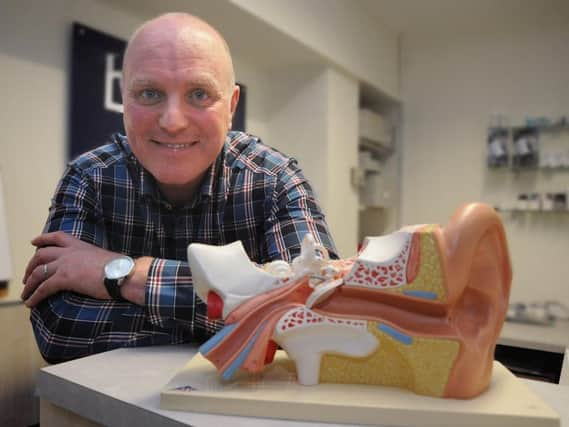Martin's life-altering therapy


This is the curse endured by sufferers of tinnitus.
But unlike the above examples, the condition manifests as sounds heard from inside the body. It’s something Burnley resident Mary Horne, plagued by incessant whistling, buzzing and screeching, sounds which peak at night, is all too familiar with. Having few night-time distractions to drown them out, the sounds concentrate, monopolise and colonise - her mind a never-ending merry-go-round of discomfort.
“It’s non-stop,” she said. “I can’t sleep.”


The cause is unknown, though she suspects it might be the result of a trapped nerve suffered two years ago. It might also lay its roots, she believes, in her time working in a mill - an intensely noisy weaving shed. And as her deafness has developed over time, the tinnitus has intensified.
Advertisement
Hide AdAdvertisement
Hide AdIt’s not surprising that its persistence is having a significant impact on her sleep.
“I’m so tired when I get up in the morning, I can’t do anything.
“The mind’s very powerful and mine is going all the time. I wouldn’t wish it on anyone.”


And while there’s a huge number of people suffering, there is little information out there. Mindfulness teacher Martin Grindrod, however, is bringing therapy sessions to Burnley - a course that transformed his own life - to help ease secondary problems, like insomnia, anxiety and depression.
Advertisement
Hide AdAdvertisement
Hide Ad“We call mindfulness an integrated mind-body training,” he said. “It changes your relationship with your stressful thoughts and difficult experiences. It’s a special kind of non-judgemental awareness.
“People who engage in mindfulness learn to free themselves from internal chatter about how tinnitus affects their life, which can be as upsetting as the sounds themselves.
“Mindfulness encourages people to bring awareness to tinnitus and to approach it with compassion, understanding, acceptance and curiosity.”
And the results, Martin has found, can be profound.
“The research shows that people who have participated in an eight-week mindfulness stress-reducing course have reported improved sleep, depression and anxiety levels, which decrease immediately. This reduction can be long-term - up to 12 months.
Advertisement
Hide AdAdvertisement
Hide Ad“The focus is on theoretical and practical elements and the thoughts people have that can negatively affect the difficult experience. Mindfulness teaches you to step back and to observe your thoughts, rather than always living from the perspective of them.”
As Martin said: “Thoughts aren’t necessarily facts. We can get wrapped up in them and need to learn to observe them and give ourselves the choice to buy into or release the thoughts without latching onto them. We have a tendency to very quickly move from interpretations of the thoughts as innocuous to catastrophising.”
Martin’s eight-week courses - the minimum needed, he explained, for lasting change - will involve practical meditation underpinned by theory.
“It might sound counter-intuitive,” he said, “But I suffered from chronic pain and turning towards my feelings associated with the pain helped me better understand my condition, which increased my resilience.”
Advertisement
Hide AdAdvertisement
Hide AdMartin, once a keen runner and practicer of martial arts, was dealt a blow when diagnosed with osteo-arthritis. In his early 40s, he was told by a surgeon he’d need a double hip replacement. Plagued by pain, he undertook a course of mindfulness.
“I had one hip replacement and haven’t needed the second because I’ve learnt to manage the pain through mindfulness. When you meditate, your brain changes in a positive way - areas of the brain associated with stress actually shrink while other parts dealing with calmness increase. It’s down to what scientists call brain plasticity.”
It’s something he’s witnessed time and again during his career.
“I’ve had people say they their relationship to tinnitus has changed - they’ve almost befriended and learned to understand it.”
*Details of the courses will be made available soon on https://inspiremindfulness.co.uk/
Alternatively, call 07967 762 774 to make an inquiry.